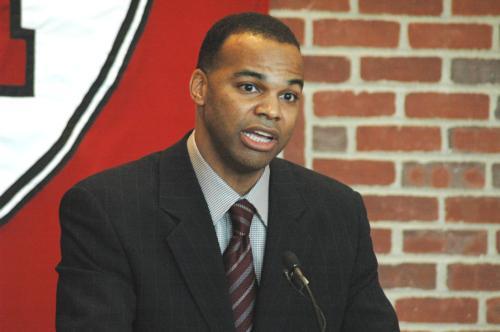
News
Summers Will Not Finish Semester of Teaching as Harvard Investigates Epstein Ties

News
Harvard College Students Report Favoring Divestment from Israel in HUA Survey

News
‘He Should Resign’: Harvard Undergrads Take Hard Line Against Summers Over Epstein Scandal

News
Harvard To Launch New Investigation Into Epstein’s Ties to Summers, Other University Affiliates

News
Harvard Students To Vote on Divestment From Israel in Inaugural HUA Election Survey
Coach Faces Recruiting Inquiries
Times article accuses basketball coach of questionable tactics

Three months after head coach Tommy Amaker led Harvard basketball to victory over Big Ten opponent Michigan, the new hire is making national headlines again. This time, however, Amaker is facing questions about his staff’s recruiting tactics and academic priorities after signing the most highly touted recruiting class in Ivy League history.
On Saturday, The New York Times reported that the Harvard basketball coaching staff has “adopted aggressive recruiting tactics that skirt or, in some cases, may even violate National Collegiate Athletic Association rules.”
The article stated that current assistant coach Kenny Blakeney had recruited Norfolk, Va. basketball player Keith Wright and Washington, D.C. star Max Kenyi to attend Harvard prior to being hired to Amaker’s staff. According to the article, Blakeney participated in pickup basketball games with both players last summer before he was hired by the Crimson on July 2, 2007 and recruiting for an institution by a person not employed by the school is considered a violation of NCAA rules. Both players have committed to attend Harvard next year, and the Times reported that both have received “likely letters” from the admissions office.
The article also included claims from Les Rosen, the father of Zack Rosen, who has committed to play for the University of Pennsylvania, that Amaker had approached him during a recruiting “dead period,” when contact between coaches and recruits is not permitted by NCAA rules, to encourage Rosen to make a visit to Harvard.
Any infractions would have to be reported by the University to the NCAA, and there is no indication that Harvard has done so. An NCAA representative said yesterday that it is the organization’s policy not to comment on potential investigations.
Amaker declined to comment in person on the allegations when asked about the Times article following the Crimson’s loss to Cornell on Saturday night.
“I haven’t read the story,” Amaker said, “and I don’t have anything else to add on top of what has already been said by the University.”
Amaker did release a statement to the Times that was included in the story.
“Harvard adheres to austere standards in every area of the university and I am honored to labor within that framework,” the statement read. “Individuals with knowledge of our staff understand the high principles under which we operate. We work within the spirit of Harvard and the Ivy League.”
According to the Times article, a few of this year’s recruits had fewer points on the Academic Index—the Ivy League’s measure for determining if recruited athletes meet the academic standards of member institutions—than would have been allowed in previous years. The Academic Index formula relies on an athlete’s GPA, standardized test scores, and class rank to determine a “score” that is weighed in the recruiting process.
The Times reported that, according to two former Harvard assistant coaches, last year’s team had an average of 206 on the Academic Index, among the highest of the eight teams in the league. As a result of the high average, the assistant coaches said that players with indexes lower than 195 would not be recruited.
Both Wright and Kenyi, according to the Times, have lower Academic Index numbers than in years past. Frank Ben-Eze, regarded as the biggest recruit Amaker has landed for this year’s class by most scouting services, has not yet reached the Academic Index minimum of 171 points to earn admission.
The admissions office has maintained that it has not lowered its academic standards.
According to an admissions office statement, “The admission of Harvard athletes represents the highest levels of Ivy League principles and practices. Any reports to the contrary are inaccurate and premature as students are not admitted until the end of March.”
The admissions office would not provide further comment than the official statement.
In the released statement, Harvard admissions officials asserted that their adherence to the Ivy League rules would be evident once Harvard releases its annual report to the Ivy League office in the spring.
Although the Times article discussed specific recruits who have received likely letters, admissions decisions will not be sent until March 31.
“At this point any story by the New York Times based on any individual’s possible admission or rejection would be speculative, premature, and potentially misleading,” University spokesman Alan J. Stone said in a written statement.
“We are very proud of the students who have been part of Harvard basketball over the years,” the admissions office said, “and we are confident that the students who will enroll next year will be equally outstanding during their college years and beyond.”
—Kevin C. Reyes contributed to the reporting of this story.
—Staff writer Brad Hinshelwood can be reached at bhinshel@fas.harvard.edu.
—Staff writer Arianna Markel can be reached at amarkel@fas.harvard.edu.
Want to keep up with breaking news? Subscribe to our email newsletter.
